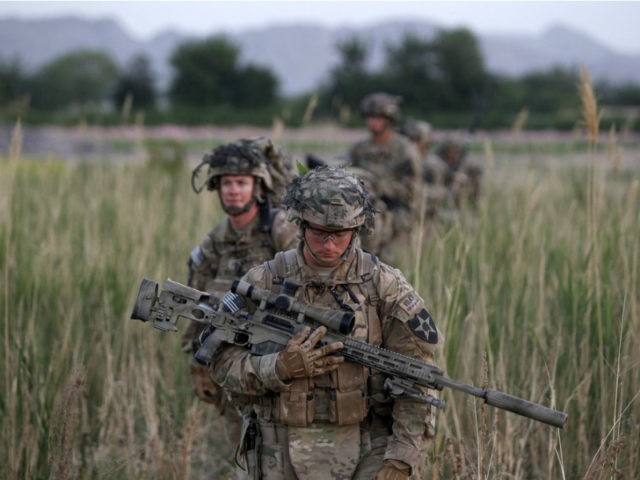A Green Beret, experienced in combat, slams the military command in Afghanistan and political leaders in Washington over a war effort in the South Asian country that he declares suffers from “moral cowardice” and a “profound lack of strategy.”
In a sworn statement that was part of the recently declassified, heavily redacted Pentagon report into the mistaken U.S. airstrikes on a Doctors Without Borders hospital in the Afghan province of Kunduz, the Green Beret has accused U.S. policymakers of intentionally keeping the 14-year military effort in Afghanistan vague.
That allows politicians to “reap the rewards of success without facing the responsibility of failure,” declared the Special Forces soldier, who was not identified like other service members mentioned in the report.
“The enemy operates with impunity throughout the country due to our relentless commitment to avoid principled strategy and decision-making processes,” he added in a section of his statement titled, “Profound Lack of Strategy.”
According to the 700-page report, some troops on the ground in Afghanistan are confused by the rules of engagement (ROEs).
The Green Beret told investigators, “‘How far do you want to go?’ is not a proper response to ‘How far do you want us to go?’”
He added:
It’s not a strategy, and in fact it’s a recipe for disaster in that kinetic of an environment … How have we, as a force, as a group of officers, become so lost from the good lessons that our mentors taught us? I will tell you how. It is a decrepit state that grows out of the expansion of moral cowardice, careerism and compromise devoid of principle, exchanged for cheap personal gain.
We owe the man on the ground more than that, because for him, the decision that he makes hopefully lands him somewhere between the judge’s gavel and the enemy bullet.
The Green Beret’s comments came as the Taliban was intensifying its insurgency. President Obama took away the U.S. military’s authority to defensively attack the Taliban when he ended the U.S.-led combat mission in Afghanistan at the end of 2014.
U.S. forces are only allowed to fire against the Taliban in self-defense. However, as the terrorist group has become stronger, it appears that it is becoming increasingly difficult for the American forces to wait for the enemy to fire first.
“There is a fine line between not conducting operations to keep people out of harm’s way and not conducting operations in such a fashion that it actually increases overall risk to force and risk to mission,” noted the unnamed Special Forces soldier.
In late September 2015, the Taliban briefly retook control of Kunduz city, part of the jihadist group’s former stronghold in northern Afghanistan and the first provincial capital to fall into the hands of the militants since they lost power following the U.S.-led invasion in October 2001.
The Green Beret’s Operational Detachment Alpha (ODA) was tasked with assembling an Afghan force to seize back the city from the Taliban.
During the operation, a U.S. Air Force AC-130 gunship opened fire for nearly 30-minutes on the Doctors Without Borders hospital inside Kunduz city, killing 42 medical staff, patients and caretakers. The Pentagon has argued that the October 3 airstrikes were a mistake and that U.S. troops intended to hit enemy combatants at a different building.
“When an ODA’s mission runs headlong into national strategy, and the detachment asks for guidance on the level of commitment and receives nothing back over a 96-hour period, that’s an abject failure of leadership,” said the Green Beret, referring to the operation to retake Kunduz city.
“Inaction or indecision does, however, enable convenient political expedience, where one can reap the rewards of success without facing the responsibility and consequence of failure,” he added.
The Special Forces soldier noted that his ODA unit, whose mission was to advise and assist the Afghan forces without engaging in combat, ask commanders to clarify the rule governing their role.
“Sadly, the only sounds audible were the sounds of crickets … though those were hard to hear over the gunfire,” he told investigators.
The Obama administration maintains that the U.S. combat mission in Afghanistan is over. However, operations such as the one that took place in Kunduz show that is not the case.
According to the Special Inspector General for Afghanistan Reconstruction (SIGAR), a watchdog agency appointed by Congress, U.S. troops were drawn into combat against the Taliban a year after President Obama said the American military had ceased its combat mission in Afghanistan.
An estimated 8,850 U.S. troops are currently serving in Afghanistan. That number is expected to go down to about 5,000 by next year.

COMMENTS
Please let us know if you're having issues with commenting.